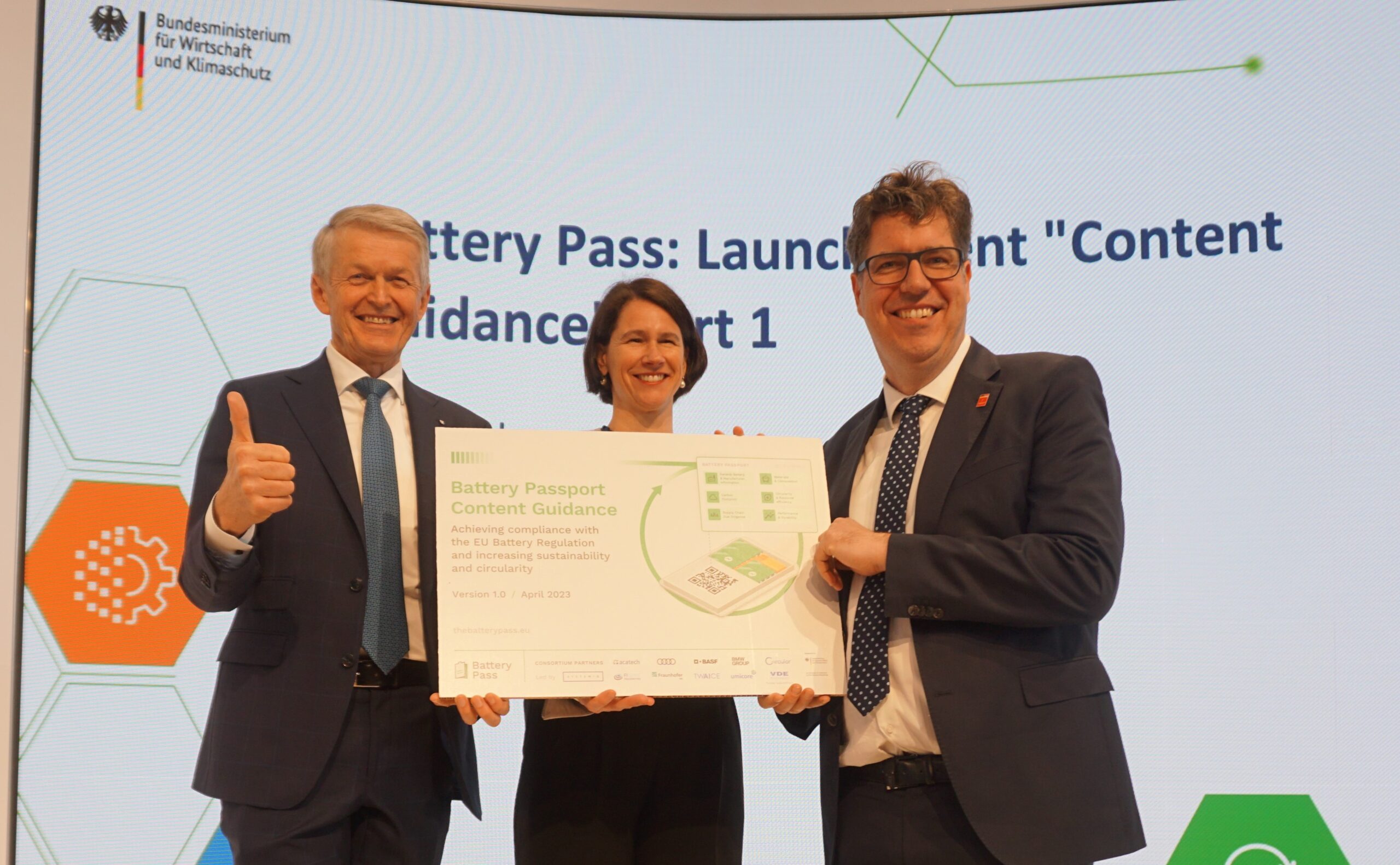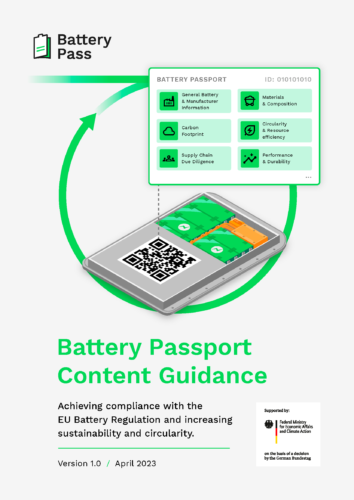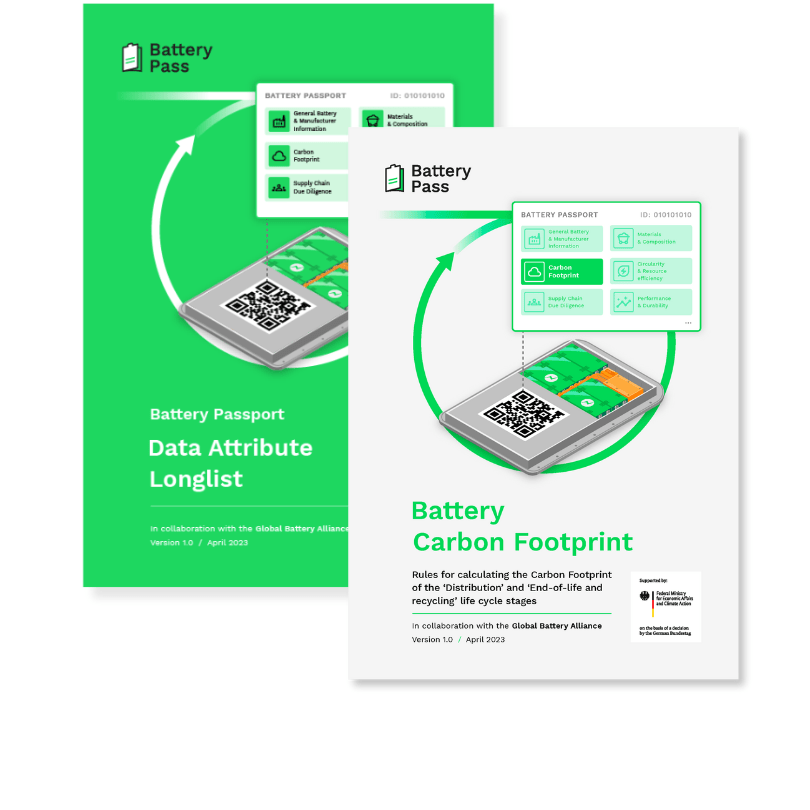Batteries are indispensable in the transition to clean and renewable energy. But manufacturing them goes along with many environmental, social, and governance issues. Digital battery passports – as required by the upcoming EU Battery Regulation – will be a core tool to enable the sustainable scaling of battery value chains globally. The first Battery Passport Content Guidance is now available to help the industry increase circularity and sustainability.
This first publicly available Content Guidance is designed to support the implementation of the battery passport, in a way that is feasible for industry players while guaranteeing the environmental and economic benefits of a digital product passport.
The guidance has been developed by the Battery Pass consortium – led by Systemiq Germany GmbH and comprising eleven leading international organisations from industry, technology and science.
A battery passport is a digital record that documents aspects of the production and usage of the battery and provides crucial information for repairing, reusing and recycling it. Using passports will verifiably and credibly ensure that batteries comply with EU requirements for sustainability and circularity, and close information asymmetries along the value chain to unlock sustainable and circular value creation.
Tilmann Vahle, the Battery Pass consortium’s programme lead, explains: “We believe that digital product passports are a key tool to realize the twin transformation of digitalization and sustainability. They are designed to increase transparency and provide data for the economy, to guide consumers, businesses, and regulators to take better decisions.”
The documents – created with co-funding from the German Federal Ministry for Economic Affairs and Climate Action (BMWK) – provide timely and comprehensive guidance to organisations responsible for implementing the battery passport, and for other battery value chain participants, on how to achieve compliance with the Battery Regulation and enable increased sustainability and circularity.
The guidance was officially handed over on 17 April at the Hannover Messe to Michael Kellner, Parliamentary State Secretary at BMWK, in a ceremony hosted as part of the Ministry’s programme on ‘Funding focus “Battery cell production in Germany”. Sustainable battery cell production – a cornerstone for the climate-friendly mobility of the future’.

”This is a major milestone in the project’s 3-year journey and for digital, sustainable battery value chains as a whole. It will help companies developing battery passports to shape these efficiently and in accordance with EU law. It may also be a sound foundation for the evolution of digital product passports in general. Not least, it is a prime example of a multi-stakeholder contribution to the European agenda of the “twin transition” to a more sustainable and digital economy.
Michael KellnerParliamentary State Secretary, BMWK
”The Battery Pass complements further acatech activities such as Gaia-X or the Mobility Data Space and is a building block for implementing a data economy. Trusted information sharing in the battery value chain, as elaborated in this Content Guidance, is a cornerstone for a circular economy: it brings together the twin transformations of sustainability and digitalization.
Prof. Dr.-Ing. Thomas WeberPresident, acatech
”Digital battery passports can reduce GHG emissions from battery manufacturing, increase resource efficiency along the entire value chain, and help to uphold human rights standards. They are a critical aspect of ensuring resilient supplies of critical raw materials for Europe’s mobility transition.
Sophie HerrmannPartner, Systemiq GmbH and Programme Director, Battery Pass Consortium
The Content Guidance
- aggregates, interprets and assesses the content requirements mandated by the EU Battery Regulation. This includes highlighting ambiguity and inconsistencies in the legal text and scope as well as ensuring a reasonable balancing of sustainability objectives with industry feasibility;
- explores further key regulatory frameworks such as the Ecodesign for Sustainable Products Regulation, to highlight harmonisation potential with other legislation; and
- suggests additional value-adding aspects beyond the mandatory regulatory scope to enable increased sustainability and circularity.
The Content Guidance is complemented by two further documents:
- A compact and user-friendly Battery Passport Data Longlist comprising around 100 mandatory and voluntary data attributes outlined in the EU Battery Regulation; and
- The Carbon Footprint Rules, which provides accounting rules to calculate company-specific product carbon footprints of the battery ‘Distribution’ and ‘End-of-life and recycling’ life-cycle stages. The rules are integrated as a companion to the GBA GHG Rulebook version 1.5, thus providing a cradle-to-grave Battery Carbon Footprint Rulebook.
What's next
Over the course of 2023, the Battery Pass project will explore how to further develop the Content Guidance in collaboration with other stakeholders. From mid-May to mid-July 2023, we are hosting a series of five webinars to take deep dives into key sections of the Content Guidance. Find out more and register for individual or all webinars. To stay in touch you can also sign up to the Battery Pass newsletter or contact the Systemiq Battery Pass team at [email protected].
Furthermore, the consortium will focus on shaping the first technical reference framework in accordance with EU requirements. This will allow any economic operator and other battery passport frameworks to develop compliant and interoperable passports.



